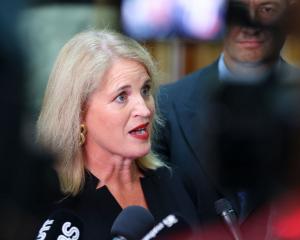
US President Donald Trump's "reciprocal" tariffs on dozens of countries have taken effect, including a massive 104% duties on Chinese goods, deepening his global trade war even as he prepared for negotiations with some nations.
Trump's punishing tariffs have shaken a global trading order that has persisted for decades, raised fears of recession and driven worldwide stocks sharply downward.
The S&P closed below 5000 for the first time in nearly a year on Tuesday and is nearing a bear market, defined as 20% below its most recent high.
S&P 500 companies have lost $US5.8 trillion ($NZ10.5 trillion) in stock market value since Trump's tariff announcement last week, the deepest four-day loss since the benchmark was created in the 1950s, according to LSEG data.
A sell-off across Asian markets resumed on Wednesday after a brief respite, with Japan's Nikkei down over 3% and South Korea's won currency sliding to a 16-year low. US stock futures also pointed to a fifth straight day of losses on Wall Street.
Trump has offered investors mixed signals about whether the tariffs will remain in the long term, describing them as "permanent" but also boasting that they are pressuring other leaders to ask for negotiations.
"We have a lot of countries coming in that want to make deals," he said at a White House event on Tuesday afternoon (local time). He said at a later event that he expected China to pursue an agreement as well.
Trump's administration has scheduled talks with South Korea and Japan, two close allies and major trading partners, and Italian Prime Minister Giorgia Meloni is due to visit next week.
The prospect of deals with other countries had pushed stock markets up earlier on Tuesday, but US stocks had ceded their gains by the end of the trading day.
Trump has nearly doubled duties on Chinese imports, which had been set at 54% last week, in response to counter-tariffs that Beijing announced last week. China has vowed to fight what it views as blackmail.
Economists have warned that US consumers are likely to face higher prices on everything from sneakers to wine as a result of the trade war.
The full effects of Wednesday's tariffs may not be felt for some time, as any goods already in transit as of midnight will be exempt from the new levies as long as they arrive in the United States by May 27.
Trump's earlier across-the-board 10% tariffs on all imports from many countries began on Saturday. The latest round of duties, which took effect at 12.01am (US Eastern Time), were aimed at countries that are "ripping off" the US, according to Trump.
That list includes many of the United States' closest allies, including the European Union, which was hit with a 20% tariff. Vietnam, which benefited from the shift of US supply chains away from China during Trump's first-term trade war with Beijing, faces a 46% tariff.
Trump has said the tariffs are a response to barriers put on US goods that have stymied American businesses. He has also accused countries including Japan of devaluing their currencies to gain a trade advantage - something Tokyo denies.
Japan's finance minister on Wednesday said trade negotiations with Washington could include foreign exchange rates.
Trump has signalled he may not be finished on tariffs.
In remarks to Republican lawmakers on Tuesday evening, he said he would soon announce "major" tariffs on pharmaceutical imports, one of a handful of categories of goods that have been exempted from the new taxes.
China is bracing for a war of attrition, and manufacturers are warning about profits and scrambling to plan new overseas plants. Citing rising external risks, Citi cut its 2025 China GDP growth forecast to 4.2% from 4.7%.
Canadian Prime Minister Mark Carney said his country's 25% tariff on some vehicles - a countermeasure to match Trump's approach - will take effect immediately after midnight on Tuesday.
"President Trump caused this trade crisis - and Canada is responding with purpose and with force," Carney said on X.
Canada and Mexico were exempt from the new round of tariffs Trump announced last week, but previous levies remained in place. Most goods that comply with the existing trade agreement between the three countries are not subject to those tariffs.
AMERICANS WORRIED ABOUT PRICES
Three out of four Americans expect prices to rise as Trump's tariffs kick in, according to a Reuters/Ipsos poll.
Chipmaker Micron told customers it will impose a tariff-related surcharge starting on Wednesday, while US clothing retailers said they are delaying orders and holding off on hiring. Running shoes made in Vietnam that now retail for $US155 will cost $US220 when Trump's 46% tariff on that country takes effect, according to an industry group.
Consumers are stocking up while they can. "I'm buying double of whatever - beans, canned goods, flour, you name it," Thomas Jennings, 53, said as he pushed a shopping cart through the aisles of a New Jersey Walmart.
Broad-based price hikes may not show up immediately, as tariffs will not apply to goods that were already in transit before they took effect.
The market slide has prompted some business leaders, including those close to Trump, to urge him to reverse course.
Global oil prices steadied after falling to four-year lows.
The European Commission, meanwhile, is mulling counter-tariffs of 25% on a range of US goods including soybeans, nuts and sausages, though other potential items like bourbon whiskey were left off the list. Officials said they stood ready to negotiate.
The 27-member bloc is struggling with tariffs on autos and metals already in place, and faces a 20% tariff on other products on Wednesday.
Trump has also threatened to impose tariffs on EU alcoholic drinks.












